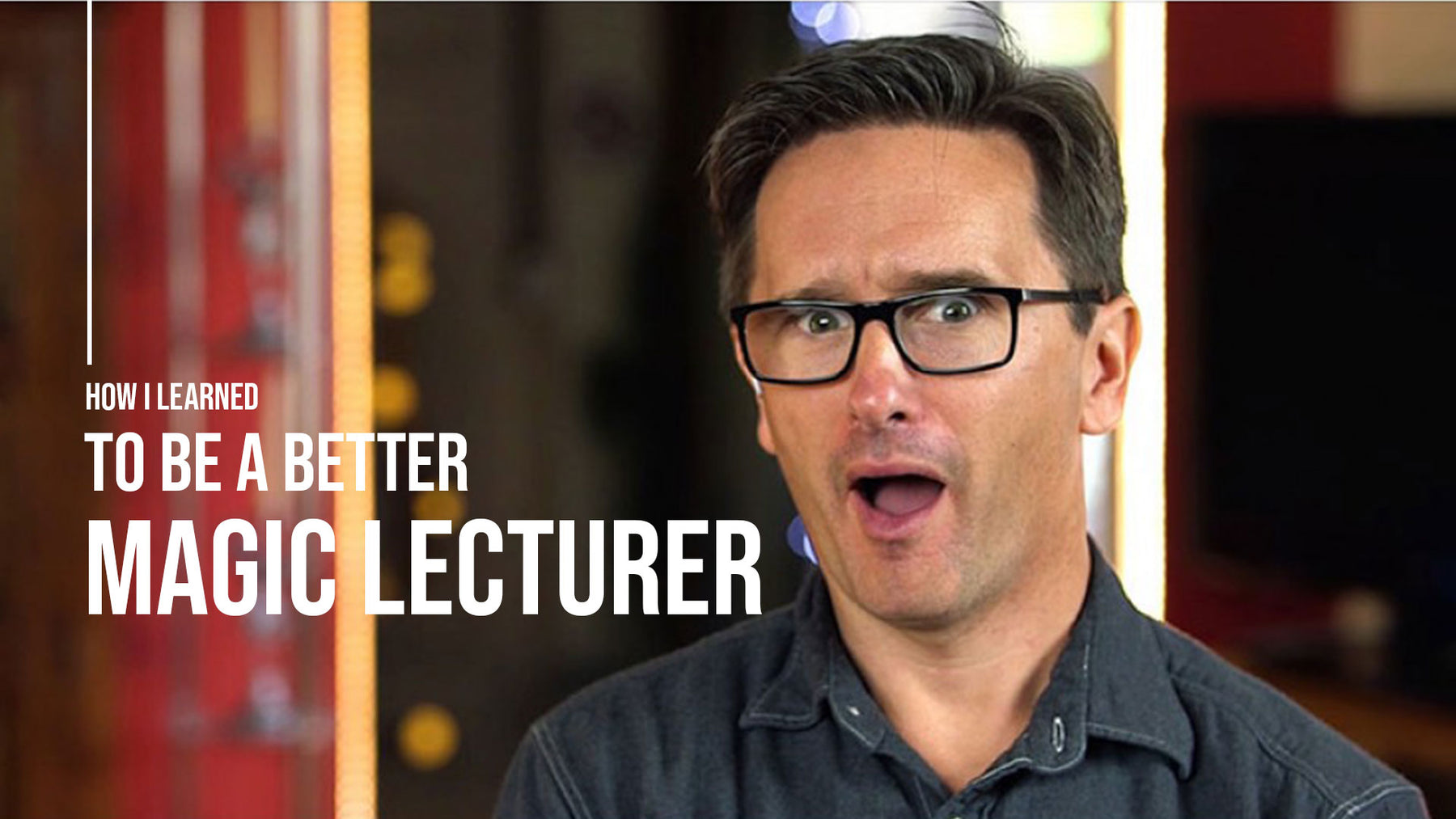
How I Learned To Be A Better Magic Lecturer
SWORDFISH
or How I Learned To Be A Better Magic Lecturer
by Cameron Francis
What is a magic lecture?
The term “magic lecture” makes me twitch. I'm of two minds about it. My main problem with those two words placed in such close proximity to each other is that they are diametrically opposed.
Magic = Fun
Lecture = Snooze Fest

The Marx Brothers are agents of chaos. Academia is stuffy boring. They are diametrically opposed. But when you unleash the Marx's in a stuffy setting, you launch comedic fireworks.

Magic Lectures

1. Starting the magic lecture
I always start my lectures by doing a routine; at least three tricks back to back, each trick flowing into the next. For example, I might start with an Ace production and then immediately go into a four Ace packet trick with a signed card. Then I might use that signed card for a third trick. This is not only entertaining but it also gives the attendees a chance to learn who I am as a performer and my style of magic. It also establishes that I am a legit performer who knows what he's doing (or at least make it seem like I know what I'm doing. Fake it till you make it, baby). This is important. Because if your audience doesn't trust you, you lose them right away.
2. The Explanations
After the mini magic show, I explain how to do the three or four tricks I just demonstrated. And to keep things moving, I just give a cursory explanation of each effect. There usually isn't time for a deep dive and it's too much information to absorb in one sitting anyway (This is the main difference between a traditional lecture and a workshop). If they want a detailed explanation, it's in my Magic Fun Time Party Secrets Revealed notes – Sorry! LECTURE notes. What I want people to take away from the presentation is a desire to learn more about my magic. It's a taster, if you will.
3. The rest of the magic lecture
Once the mini show and explanation of the effects established that I'm fairly legit, then I'm able to move on to a more traditional, here's a trick and then here's the explanation approach.

I feel it's also important to present a variety of plots so as not to come across repetitive or redundant. Again, it's a show. And if you were doing a show in front of lay people, you wouldn't follow up sawing a person in half with sawing a cow in half. So I might start off with a production, followed by a transformation, followed by a transposition, followed by a vanish, followed by a color change, etc. Of course, there are only so many plots in magic. So there may be more than one vanish in a lecture. But I space them out so I don't do two vanishing effects in a row. As you would in any show, I always try to end with a real show stopper. A trick that builds with huge impact.
An impactful magic lecture
So that's the form and shape of the lecture. But what about the substance? The stuff that runs the engines, that makes the tricks impactful; the philosophy and theory of the magic? Rather than slam on the brakes and talk about theory (Even though it's called a lecture, I would never want it to feel like a lecture), I simply include it in the explanations of each effect. I talk about the choices I made while creating the tricks and why I think a particular move works or why I say what I say when I say it within the context of explaining the trick. This way the attendees get a real time look inside the creative process.

Before I go on, I have to tell you that my lecturing style was largely influenced by my dear friend, the late, great, Aldo Colombini. Aldo was brilliant. He knew magic inside and out. But he was had no time or patience for pretentious nonsense. He knew how to explain magic succinctly and entertainingly but he also gave you the nuggets of knowledge you need to make your magic better without resorting to boring sidebars. And he never came across as self-important. His funny, down to earth style heavily influenced how I present my magic. Heck, Aldo helped to arrange my first magic lecture tour over fourteen years ago. So I owe him a lot. I miss him dearly. Aldo was a great magician, a great friend, and a great cook (he made the best pasta ever).

For me, magic lectures are not just about imparting knowledge, they are also about gaining knowledge. About my magic. About audiences. About magicians in general. Things don't always go as planned. Some tricks don't hit. Sometimes an attendee will have an amazing idea for a trick that I never thought of. Sometimes people will flat out tell me they didn't like what I did. Sometimes people will love what I did. All of it feeds me. Makes me better. Makes me grow. Makes me a better magician.
Anyway, those are just some of my thoughts about presenting magic to other magicians. I hope you got something useful out of them. And even though it's a lot of words, if you could start calling lectures Magic Party Fun Time Secrets Revealed Shows, I would really appreciate it.
Find Cameron Franci's magic here
and
contact him on instagram here

Leave a comment